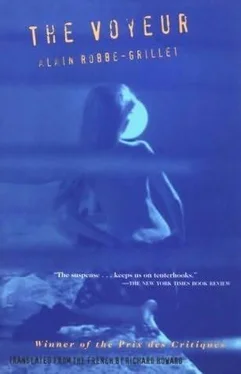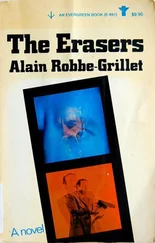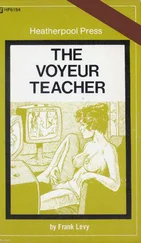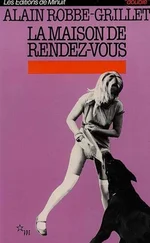A little farther on he noticed a cottage set back from the road at the end of a long, ill-kept path. Its poverty-stricken appearance excused him from even attempting a visit there. He looked at his watch: it was after midday.
It was easier riding now that the road had stopped going uphill. Soon he was at the crossroads. On the white milestone he read the freshly repainted directions: “Black Rocks Lighthouse—One Mile.” Everyone on the island called it “the big lighthouse.” After another fifty yards he left the road, turning left on the fork to the Marek farm.
The countryside was noticeably different here: there was an embankment on either side of the road lined with a thick, virtually unbroken hedge behind which rose the occasional trunk of a pine leaning toward the southwest, the direction of the prevailing winds (that is, the trees on the left side of the drive leaning over the hedge, those on the right leaning away from it ).
In his haste to reach his immediate goal, Mathias tried to pedal faster. The bicycle chain began to make an unpleasant sound—as if it were rubbing sideways against the sprocket-wheel. He had already felt something strange about it shifting gears on the last hill, but he had not given it any thought, and the grating noise had gradually diminished—unless he had merely ceased noticing it. Now, on the contrary, it grew more pronounced—so rapidly that the traveler decided to stop. He put his suitcase down on the road and crouched down to examine the transmission, turning the pedal with one hand. He decided that he needed only to apply a little pressure to the sprocket-wheel, but in manipulating it he brushed against the chain itself and covered his fingers with spots of grease which afterward he had to wipe off as well as he could on the weeds growing along the road. He got back onto the seat. The suspicious noise had virtually disappeared.
As soon as he had entered the courtyard of beaten earth that extended in front of the farmhouse (actually the terminal enlargement of the road which came to a dead end here), he saw that the heavy wooden shutters of both ground-floor windows were drawn. The door between them, which he expected to find wide open, was also closed. The two upper-floor windows, situated just over those on the ground floor, had their shutters open but were closed in spite of the bright sunshine on the panes. Between them, above the door, was a large expanse of gray stone where a third window seemed to be missing; instead a little niche had been cut into the wall, as if for a statuette; but the niche was empty.
On either side of the door was a clump of mahonia; the still-greenish flowers were beginning to turn yellow. Mathias propped his bicycle against the wall of the house under the drawn shutters of the first window, to the left of the left mahonia bush. He walked to the door, still holding his suitcase in his hand, and knocked on the door panel—for conscience’ sake, since he knew that it would not be opened.
After a few seconds he knocked again, this time with his ring. Then he stepped back and lifted his head toward the first-floor windows. Obviously no one was there.
He looked toward the haysheds at the end of the courtyard, turned back toward the door by the same way he had entered the courtyard, walked three yards in that direction, stopped, turned around and walked in the opposite direction again, and continued this time as far as the garden fence. The lattice-gate was padlocked.
He returned to the house. The shutters of what must have been the kitchen window looked as if they had been merely pushed together to keep out the sunlight. He walked over and tried to open them, but did not succeed: the bolts had been shot inside.
Mathias could do nothing but leave. He returned to where he had propped the bicycle against the wall under the other window, got on it and took the same road back, holding the handlebars in his right hand and the suitcase in his left—which he also used to apply a slight pressure to the left grip of the handlebars. He had hardly reached the main road when the grinding noise began again—much louder this time. About a hundred yards in front of him a country woman carrying a knapsack was walking in his direction.
He would have to get off again in order to push the chain back onto the cogs of the sprocket-wheel. As before, he could not help dirtying his fingers. When the operation was completed and he stood up, he realized that the wizened, yellow-faced woman about to pass him was old Madame Marek.
She did not recognize him right away. If he had not spoken to her first, she would have gone on without looking at him, so little chance did she think there would be of meeting him here. To excuse herself she claimed that Mathias’ face had changed since the last time they had seen each other, in the city, and that he looked very tired today—which was to be expected, since he had had to get up much earlier than usual to take the boat, and without having gone to bed earlier the night before. Besides, he hadn’t been sleeping well for several days.
Their last meeting had been at least two years ago. Mathias announced that he had changed his job since then: he was selling wrist watches these days. He was disappointed to have found no one at the farm, for his moderately-priced wares would certainly have interested Robert and his wife. How did it happen that neither of them was at home, nor any of the children? Mathias hoped that they were all well, nevertheless.
Yes, they were all in good health. The grandmother specified the reason for the absence of each one in turn—the father in town, the mother on the mainland for fifteen days, the children not yet back from school, etc….—and declared that if Mathias passed by again in the course of the afternoon he would find Robert at home, and Josephine as well; the poor girl certainly needed a watch to get her work done on time—she was always fifteen minutes late for something.
The salesman had doubtless just missed the father and the three younger children who generally came home around twelve-thirty. They took the short cut across the fields and came in through the garden, behind the house. Perhaps, she added, they had arrived by now; but she did not invite Mathias to join her, which he dared not propose himself, hesitating to disturb them all at dinnertime. She merely asked him to let her see the watches and he had to show them there at the roadside, putting the suitcase down on the ground. Just next to it, flattened in the dust of the road, was the dried corpse of a toad.
In a hurry to get home, the old woman did not take long to decide. She wanted to give a nice present to her grandson—the one who worked as an apprentice at the bakery—for his seventeenth birthday. She took the hundred-fifty-crown model (with metal strap)—that was good enough, she said, for a boy. The salesman assured her she would not regret her choice, but the old woman was not interested in a description of the item’s qualities; she cut short his explanations and guarantees, paid him, thanked him, wished him good luck, and hurried away. Not knowing where to put the watch which the salesman, accustomed to home sales, was not equipped to wrap very carefully, the old woman had fastened it around her own wrist—but without setting the hands at the correct time, although the watch was wound.
Crouching in front of his suitcase, Mathias replaced the cardboard strips, the prospectuses, the black canvas memorandum book, closed the cover, and fastened the clasp. He looked more closely at the grayish spot on the white dust of the road which he had first taken for the remains of a frog. The hind legs were too short—it must have been a toad (besides, it was always toads that got run over). Its death could not have occurred earlier than the night before, for the creature’s body was not as dry as the dust made it look. Near the head, which was distorted by being flattened, a red ant was trying to find a scrap that was still usable.
Читать дальше












